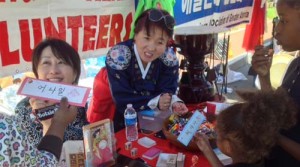
By Jong Won Lee
Special to the NNPA from Korea Daily
Via New America Media
ATLANTA — For decades, South Korean immigrants have dominated the U. S. wig industry — a niche they carved out in part by winning over the African American market. Not only was competition relatively scarce, but their ties to textile manufacturers in South Korea put them in a unique position to fill a void in beauty supplies targeting African Americans.
“South Korea’s textile industry helped produce wigs that pushed into the American market,” notes Kwang Gyu Lee, emeritus professor in anthropology at Seoul National University. “Initially, Korean immigrants relied on imported supplies but later they completely monopolized the wig industry, from production, transportation, wholesale and retail.”
Some 8,500 Korean-owned beauty supply stores in the U.S. do an estimated $200 million in business annually, according to the Korean Beauty Supply Association. More than 70 percent of their customers are African American.
But these ties have begun to unravel as Korean wig shop owners feel the pinch of globalization. As labor costs spiked in South Korea, wig production moved to China where labor is cheaper. As a result, many Korean beauty supply stores that were once thriving are now struggling to survive.
“Customers began to look for lower cost beauty supplies,” says Il Hong Kim, head of the Korean Beauty Supply Association in Atlanta, where nearly all of the 700 or so beauty supply stores are Korean-owned.
A Korean owner of a beauty supply store in Santa Monica, Calif., who spoke on condition her name not be used, concurred. “Even though I started my business in the recession, I didn’t have problems,” she says. “But nowadays, the wig business is getting more globalized, with Chinese people embarking on the business, so our sales are dropping.”
Kim adds that small businesses, like his Korean beauty supply shop, are also feeling the effects of a tighter credit market.
“It’s getting difficult for new business owners to secure loans from banks,” he says, stressing that language presents an obstacle. “Koreans who want to start a business usually… get a loan from a Korean community bank, because it’s easier to communicate with staff there.”
Sang Wook Chung, owner of G’s Beauty Supply in Jonesboro, Ga., wanted to apply for a loan from a U.S. bank as his customer base was growing but says that dealing with American bankers was “very challenging.”
“They could not understand me,” Chung says. “I wish there was a Korean-speaking banker who can assist us and know about our business concerns.”
Undeterred, he went to a Korean community bank in his town. Although the interest was relatively higher compared to other American banks, and the amount of the loan he could get was smaller, the process was a lot easier.
“I had less paperwork because I didn’t have to show documents I would have had to get from South Korea,” he says. “And of course, there was no language barrier.”
An added challenge for Korean wig shop owners has been a recent spike in thefts of pricey wigs at their stores. Typically these thefts — dubbed “smash thefts” — involve a driver and other passengers who break into a shop and steal thousands of dollars in merchandise, leaving the shop owners almost bankrupt. Hair extensions made from human hair, for example, produced by companies like Remy Hair just outside Atlanta, can sell for up to $1,000.
After Hurricane Sandy hit New York in 2012, local Korean media reported smash thefts in Korean shops. Shop owners began putting serial numbers on expensive hair products and working with county police to track stolen items. Some began offering rewards for return of their merchandise.
At the same time, wig shop owners are taking steps to strengthen their ties with their traditional African American customer base.
The Korean Ethical Forum, a charitable organization that works to benefit Korean communities around the world, recently donated $50,000 to the Trumpet Awards Foundation, an African American advocacy group in Atlanta. The funds will be used to produce a documentary to promote African American student achievement in U.S. public schools, says Man Yo Han, head of the Forum.
“A colleague in the beauty supply business told me that back in the 1970s and 80s, wigs displayed in department stores catered mostly to white customers,” says Kim of the Korean Beauty Supply Association here. “Because of that, many African Americans began coming to Korean beauty supply shops. I’m proud to think that the Korean community was there to help.”
Jong Won Lee is the managing editor of Korea Daily in Atlanta.
This story was supported through a New America Media/Wells Fargo small business reporting fellowship.




